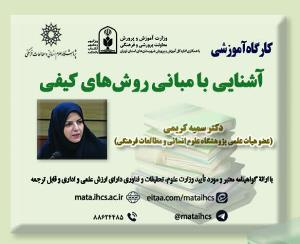انسان شناسی عرفانی جبران خلیل جبران در مقایسه با سهراب سپهری
آرشیو
چکیده
شناخت انسان از خویشتن خویش از ارکان شناخت شناسی عرفانی است. جبران خلیل(1883-1931م) شاعری واجد بارقه هایی از عرفان، ولی هنوز در آستانه معبد خلقت است. با آن که او تجربه های ناب یک عارف را از زبان "مصطفی " باز گو می کند، اما گرفتاریش در دام سنّت ها موجب شده است تا برخی او را در جایگاه عارفان بزرگ ننشانند. سهراب سپهری (1307-1359) نیز شاعری در جستجوی آگاهی، عشق و عاطفه در پیوند با عرفان است. عرفان سپهری تفاوت های ماهوی قابل توجهی با عرفان کلاسیک ایران دارد. او در اشعارش بیشتر به اندیشه عرفانی از نوع خاص بودایی تمایل نشان می دهد. این نوشتار به شیوه توصیفی و تحلیل محتوا نشان می دهد که هر دو شاعر در بیان عناصر عرفانی و انسانی مانند خودشناسی و عشق، وامدار عرفان کلاسیک اسلامی اند. عرفان جبران، بر گرفته از روح تصوف شرقی، با صبغه هایی از " کتاب مقدس " و متأثر از ادبیات غرب و شخصیت عیسی(ع) است؛ حال آن که سهراب سپهری متأثر از تصوف هند و ایرانی با پس زمینه ای از ناتورالیسم و متمایل به مکتب انسان مدارانه بودایی می باشد.Mysticism Anthropology of Jibrȃn khalil Jibrȃn compared to Sohrȃb Sepehriy
The epistemology of self-knowledge in mysticism is one of the pillars of mystical epistemology. Gibran Khalil (1883-1931) was a poet with mystical elements, but he is still on the threshold of the temple of creation. Although he recounts the pure experiences of a mystic in the words of Mustafa, his entanglement in traditions has led some to not consider him among the great mystics. Sohrab Sepehri (1307-1359) is also a poet in search of awareness of love and emotion in connection with mysticism. Sepehri's mysticism has significant differences from classical Iranian mysticism. He shows more inclination towards a special type of Buddhist mysticism in his poetry. This writing shows that both poets express mystical and human elements such as self-knowledge and love, which are characteristic of classical Islamic mysticism. Gibran's mysticism is derived from the spirit of Eastern Sufism, with influences from the Bible and Western literature and the character of Jesus (AS). On the other hand, Sohrab Sepehri is influenced by Indian and Iranian mysticism with a background in naturalism and a tendency towards the humanistic school of Buddhism.







